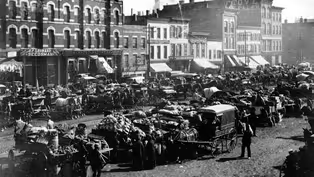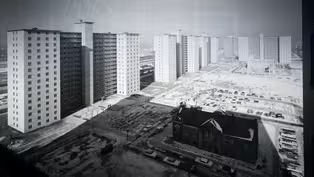Chicago Stories
Florence Scala and the Fight to Save Little Italy
Clip: 10/13/2023 | 7m 58sVideo has Closed Captions
A neighborhood activist fought to preserve Little Italy.
Though their efforts would be unsuccessful, Florence Scala and a group of activists fought to save Chicago’s Little Italy neighborhood from demolition. The community was to be razed to make way for the University of Illinois Chicago.
Problems playing video? | Closed Captioning Feedback
Problems playing video? | Closed Captioning Feedback
Chicago Stories is a local public television program presented by WTTW
Lead support for CHICAGO STORIES is provided by The Negaunee Foundation. Major support is provided by the Abra Prentice Foundation, Inc. and the TAWANI Foundation.
Chicago Stories
Florence Scala and the Fight to Save Little Italy
Clip: 10/13/2023 | 7m 58sVideo has Closed Captions
Though their efforts would be unsuccessful, Florence Scala and a group of activists fought to save Chicago’s Little Italy neighborhood from demolition. The community was to be razed to make way for the University of Illinois Chicago.
Problems playing video? | Closed Captioning Feedback
How to Watch Chicago Stories
Chicago Stories is available to stream on pbs.org and the free PBS App, available on iPhone, Apple TV, Android TV, Android smartphones, Amazon Fire TV, Amazon Fire Tablet, Roku, Samsung Smart TV, and Vizio.

Chicago Stories - New Season!
Blizzards that brought Chicago to a standstill. A shocking unsolved murder case. A governor's fall from power. Iconic local foods. And the magic of Marshall Field's legendary holiday windows.Providing Support for PBS.org
Learn Moreabout PBS online sponsorship- [Narrator] Two miles west of the Loop, the declining neighborhood of the Near West Side had also caught the mayor's attention.
- I'm very happy to announce that the City of Chicago has filed application with the federal government for an urban renewal program on the West Side of Chicago and will be aimed at making the city a better and a finer place in which to live.
- [Narrator] Taylor Street had been bypassed by the city's renewal efforts until now.
It had become home to a growing number of Black and Mexican immigrants.
But Taylor Street's close-knit Italians stayed.
- [Kathy] On Saturday nights, a shopkeeper would put her jukebox out on the street and people would dance.
Everyone I knew was Italian and everything we did was Italian.
There was a famous hair commercial about "Do blondes have more fun?"
♪ Is it true blondes have more fun ♪ - [Announcer] Why not be a blonde and see?
♪ A Lady Clairol blonde ♪ ♪ A silky shining blonde ♪ - I thought, "I don't even know a blonde."
(laughing) - [Narrator] People here were deeply connected to the neighborhood, even if it was worn at the edges.
- They were working-class homes and small family businesses that were maintained pretty well.
Most of the men in the neighborhood all had city jobs.
Everything was, "You look after me, I'll look after you."
So, the neighborhood was heavily Democrat.
- [Narrator] And when Daley and City Hall pitched urban renewal as a blessing, they believed them.
- Federal money available, what a miracle.
Who had ever thought of such a thing?
- [Narrator] At the Our Lady of Pompeii Church, neighbors met to find out how to apply for urban renewal funding.
They formed the Near West Side Planning Board and agreed to have the community designated a slum clearance site.
42-year-old Florence Scala had grown up on Taylor Street and was eager to join.
- My Aunt Florence was appointed, if you're ready for this, she would be "the housewife" represented on the board.
(laughing) That's what they said then.
She was an avid photographer.
Her job was to take pictures of all the parts of the neighborhood that were blighted so that they could justify getting federal money for fixing up these properties.
- [Narrator] Urban renewal would soon come to the Taylor Street community, but not in the way they'd been promised.
Richard J. Daley won his second term by a landslide, but his idea for a University of Illinois campus in the South Loop had stalled.
- Daley's been pushing this for a long time.
The problem, however, was that those pesky railroads wouldn't sell the land at what Daley and others considered to be a reasonable price.
- [Narrator] Other sites were proposed and rejected: Meigs Field, Goose Island, and Garfield Park.
- They finally came up with this idea of putting it on the Near West Side in the largely Italian neighborhood called Little Italy.
And one of the great attractions of that is that that area had already been assigned status for urban renewal.
- [Narrator] As rumors filtered back to Taylor Street, residents were alarmed, but Daley assured neighborhood planners it was on the list just for show.
- Now, my dad worked for the city and the mayor told him, "Oh, don't worry about it.
"There's other discussions going on "about Meigs Field or Garfield Park.
"Don't worry about it."
So, what are they gonna do?
They took the mayor at his word.
- [Narrator] But the bitter truth came for folks on Taylor Street not long after.
- When this decision came down, it dropped like a bomb.
(gloomy music) - [Narrator] 800 homes and about 200 businesses now designated as blight would be bulldozed to make way for the new university.
Eminent domain would speed construction.
And the federal government would foot nearly two-thirds of the bill under the Urban Renewal Housing Act, a boon for Daley.
And the very policies residents in Little Italy thought would improve their neighborhood would now destroy it.
- Daley decided it needed to be near the expressways so people coming into the city would see the university and they would see two new highways and they wouldn't see dilapidated buildings or people of color.
- We would hear references to the area as a slum.
It was resentful because it was not a slum.
I can remember old Italian women (laughing) in the summer and winter getting their broom out and sweeping the sidewalk.
It was such a betrayal.
And that's what started the fight.
- [Narrator] Taylor Street resident Florence Scala organized her neighbors to stage a sit-in at City Hall.
- Florence had never thought she'd become political, and she did.
- About 50 women literally stormed Mayor Daley's office and just take up residence in there.
- The women protesting, they're wearing hats and gloves (laughing) because that's what you did when you went downtown.
- Yesterday, you were in the mayor's office.
This morning, you're out in the hall.
- Yes, we're out in the hall and they're not gonna give us any chairs.
We're gonna stand here and we're gonna send out a call for some cots and sleeping bags.
We'll stay right out here in the hall today.
- So, you're gonna go on with this?
- Yes we are.
- [Narrator] They came armed with thermoses of coffee and picnic lunches... And the guts to take on a powerful mayor.
- Did you see the mayor this morning?
- Briefly, as he walked by.
He said hello.
- Was he pleasant?
- Yes, he was very pleasant.
The newspapermen were here, and of course he's always pleasant when press is around.
- Well, you know I brush no one off in this office, including the press.
We've tried to be courteous and friendly and hospitable.
These people walked in here without any appointment.
It's easy to make charges.
She's been making charges since this thing started.
- Some politicians referred to my aunt and all of these Italian women as "those Italian fish wives."
Honest to God, (laughing) that's what they referred to them as.
"These women, what are they doing?"
- [Narrator] In the end, the power of eminent domain prevailed and ordinary folks like Florence Scala learned Daley's grand plan to rebuild the city didn't necessarily include them.
- It was just clean the slate and start over, as if these people weren't people.
- [Roger] Richard J. Daley was a boss, somebody who sat on the fifth floor of City Hall and would say, "We're gonna build this here "and we're gonna tear down these buildings "and we're gonna move these people here."
So, these were big decisions.
Richard J. Daley’s Bridgeport Roots
Video has Closed Captions
Clip: 10/13/2023 | 8m 50s | Richard J. Daley grew up in Bridgeport, a community that influenced his political career. (8m 50s)
Richard J. Daley’s Influence on Public Housing
Video has Closed Captions
Clip: 10/13/2023 | 5m 10s | While Chicago’s downtown changed, Daley oversaw a new public housing in Chicago. (5m 10s)
Providing Support for PBS.org
Learn Moreabout PBS online sponsorshipSupport for PBS provided by:
Chicago Stories is a local public television program presented by WTTW
Lead support for CHICAGO STORIES is provided by The Negaunee Foundation. Major support is provided by the Abra Prentice Foundation, Inc. and the TAWANI Foundation.

















